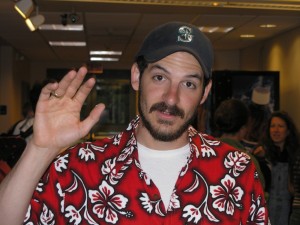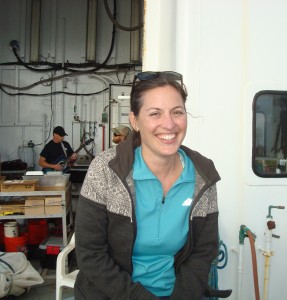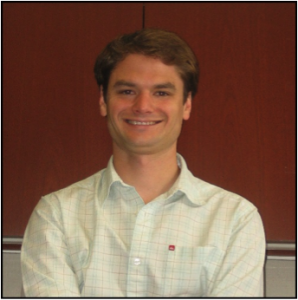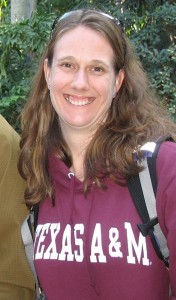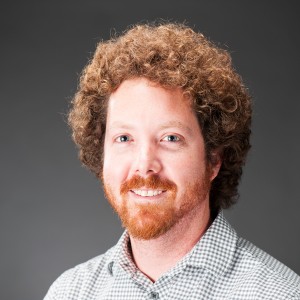Jason Addison, Ph.D.
I am a paleoceanographer, trained to use geochemical proxies to reconstruct past ocean conditions. I work at the US Geological Survey in Menlo Park, CA, in the Climate and Land Use Change Research & Development Program, and I am interested in how past climates have affected ocean ecosystems in the California Upwelling System and the high-latitude North Pacific Ocean (Gulf of Alaska, Bering Sea, and the Sea of Okhotsk). Much of my research is focused on the last ~11,000 years of Earth time, with a special interest in the last 2,000 years, which is the period of time that most clearly demonstrates the effects of human activities on natural ocean conditions. My investigations use cutting-edge technologies, such as XRF geochemistry, stable isotope analysis of organic matter, 3-D computerized tomography (CT scanning), and synchrotron-radiation methods.
Stuart Bishop, Ph.D.
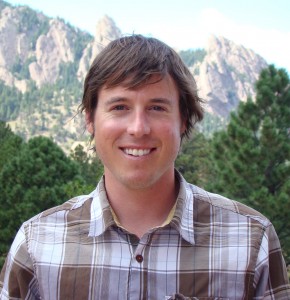 I am a physical oceanographer with interests in the role of ocean eddies in ocean circulation and how current systems will evolve in a changing climate. For this training cruise I am interested in the dynamics of the poleward flowing California Undercurrent (CUC) at the shelf break, the eddies the CUC sheds at major topographic deflections in the California coastline (e.g. Pt. Sur), and the lateral transport of water properties onto the shelf during eddy formation. I received my Ph.D. from the University of Rhode Island, Graduate School of Oceanography in 2012. After finishing my Ph.D. I moved to Boulder, Colorado where I was an Advanced Study Program postdoctoral fellow at the National Center for Atmospheric Research for two years. I recently moved to Pasadena, California where I have joined the Environmental Science and Engineering program at Caltech as a postdoctoral scholar. In my free time I enjoy being outdoors at the coast surfing or in the mountains backpacking and snowboarding.
I am a physical oceanographer with interests in the role of ocean eddies in ocean circulation and how current systems will evolve in a changing climate. For this training cruise I am interested in the dynamics of the poleward flowing California Undercurrent (CUC) at the shelf break, the eddies the CUC sheds at major topographic deflections in the California coastline (e.g. Pt. Sur), and the lateral transport of water properties onto the shelf during eddy formation. I received my Ph.D. from the University of Rhode Island, Graduate School of Oceanography in 2012. After finishing my Ph.D. I moved to Boulder, Colorado where I was an Advanced Study Program postdoctoral fellow at the National Center for Atmospheric Research for two years. I recently moved to Pasadena, California where I have joined the Environmental Science and Engineering program at Caltech as a postdoctoral scholar. In my free time I enjoy being outdoors at the coast surfing or in the mountains backpacking and snowboarding.
Joe Carlin, Ph.D.
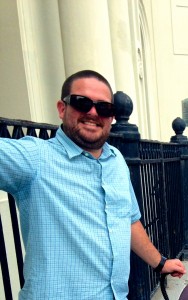
Joe Carlin is an Assistant Professor at California State University – Fullerton in the Department of Geological Sciences. He received his Ph.D. in the field of Oceanography from Texas A&M University. As a coastal marine geologist/sedimentologist his research interests are primarily focused on the transport and fate of terrestrial sediments in the marine environment, and the evidence of anthropogenic alterations to the environment preserved in the sedimentary record. During this cruise he will be collecting cores from the shelf adjacent to the Salinas River in Monterey Bay and nearby submarine canyons. From these he will be investigating the fate of past fluvial flood deposits, the partitioning of sediment between shelf and slope/canyon deposition, and the record of human activity within the coastal watersheds.
Amanda Netburn, Ph.D. Candidate
I am a graduate student at Scripps Institution of Oceanography. I study the effects of environmental changes on deep sea animals- in particular, shifts in the depths and intensity of midwater hypoxic waters, on the distributions, taxonomic composition, and metabolism of mesopelagic (200-1000m) fish communities. Aggregating in the deep, cold, dark waters of the open ocean, the diverse and abundant mesopelagic fish community is important to global carbon cycles and to marine food webs. To study these animals, I primarily use bioacoustic and direct collection methods (i.e., midwater trawl nets). My interests extend beyond field studies of deep sea critters, and into conservation, education, and outreach on this fascinating environment. I am serving as Chief Blogger for this cruise.
Ryan R. Rykaczewski, Ph.D. (Co-Chief Scientist)
I am a biological oceanographer with an interest in understanding the physical and biogeochemical dynamics of upwelling systems. I aim to study how biological productivity and species distribution in these systems respond to climate change. Currently, I am an Assistant Professor of Marine Science and Biology at the University of South Carolina where examine the ecological implications of changes in physical climate (e.g., meridional shifts in zonal winds, increases in ocean stratification, and changes in phenology). This research involves consideration of theory, observations, and models of ocean dynamics.
Amy Wagner, Ph.D. (Co-Chief Scientist)
I am a paleoceanographer/geochemist/marine geologist at California State University, Sacramento in the Department of Geology. My primary research interest is using coral geochemistry to determine past ocean and climate conditions in the western Pacific. My focus on this cruise is to learn how to organize and execute a student research cruise to expose undergraduate Geology students to coastal California marine geology.
Travis Washburn, Ph.D. Candidate
I am a benthic ecologist exploring communities associated with the deep sea. I am currently a Ph.D. candidate working at the Harte Research Institute at Texas A&M University – Corpus Christi. I received my master’s degree from the College of Charleston examining the effects of impervious cover on coastal benthic communities and have been interested in the answers these small organisms can give us ever since. Death and gravity are constants in this world. Everything eventually sinks to the sediment, making this habitat representative of the overlying conditions. My research is presently focused on deep-sea communities in the Gulf of Mexico. I am examining the effects of the Deepwater Horizon blowout on the surrounding deep-sea community as well as communities associated with natural hydrocarbon seeps. I am also attempting to define and value specific services provided by the deep Gulf of Mexico. My research involves lots of microscope work, removing animals from sediment cores and identifying them. On this cruise I plan to take several cores from a few seep locations to assess variability within a seep community. Because of the difficulty in obtaining these deep samples studies generally can only reserve two or three cores at a specific station to examine the benthos, limiting within seep comparisons.
Kenneth Coale, Ph.D. (Chief Scientist)
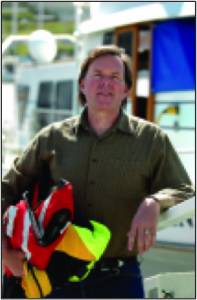
Kenneth Coale is a professor at Moss Landing Marine Laboratories: the graduate program in marine sciences and research facilities serving a consortium of seven California State University campuses. Dr. Coale is a marine biogeochemist who studies the cycles of chemicals in the sea and the natural and anthropogenic processes that influence these cycles. He was the Chief Scientist/Principal Investigator on all the US-led open ocean iron fertilization experiments in both the equatorial Pacific and Southern Ocean that have advanced the “Iron Hypothesis” of phytoplankton production and climate forcing. His research interests include trace element, carbon and nutrient cycling in ocean, coastal and freshwater systems; the application of natural and anthropogenic radionuclides in the study of marine rate processes; and the biogeochemical cycling of mercury in aquatic and atmospheric systems and the transport of Hg from the oceans to terrestrial systems via fog. Dr. Coale serves on the California Ocean Protection Council’s Science Advisory Team and is a Trustee for the Ocean Science Trust.

